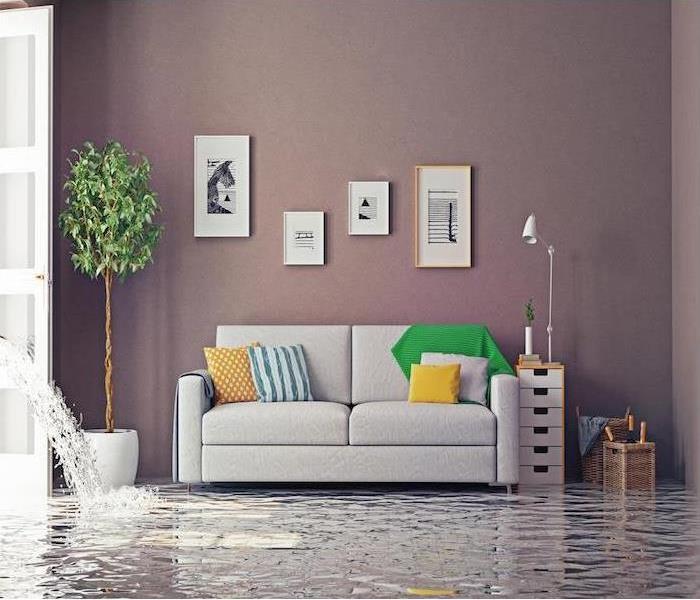Ways to Reduce Risk of Water Damage
6/29/2022 (Permalink)
Experiencing water damage can be a traumatic event for a homeowner and it could possibly destroy your possessions. Most water damage comes from problems with the house’s interior plumbing. But there are ways that you can help prevent these situations from occurring with just a little routine maintenance. These tasks will help to reduce the chances of suffering interior water damage.
Plumbing Supply System
The are several events that may happen that could indicate that your plumbing supply system may be failing. These include an increased monthly water bill, banging pipes, rust stains, moisture in the walls or floors, and signs that there’s wet soil erosion near the foundation. You can help to prevent a plumbing supply system failure by setting your thermostat to 60 degrees or higher during the cold winter months, let your faucets drip, or insulate your pipes which will help to reduce the possibility of your pipes freezing. Another way to help is to install a leak detection system.
Toilet
A toilet backing up and overflowing is a fear of every resident of a home. To make matters worse, the toilet overflowing can cause serious water damage to your home. However, there are ways that you can prevent a toilet from overflowing and damage from occurring. The easiest and most efficient way you can ensure an overflowing toilet doesn’t cause water damage is by waiting for the flushing valve to completely finish refilling the tank and the bowl after flushing the toilet. If it looks as though the toilet may overflow, you can turn off the supply valve before any overflowing occurs. You should also inspect the toilet’s components at least twice a year. This includes the fill valve, the supply valve, the flush valve, and the supply line. If all else fails, you may want to upgrade the supply line to a braided steel hose, a sturdier choice.
Water Heater
A slow leak, a sudden burst in the tank, and supply line failures are the most common problems for water heaters. To reduce the chances of water damage due to a water heater problem, you should replace your water heater after 10 years. You can find the manufacture date on the upper portion of the tank. Conducting maintenance on the water heater such as flushing sediments and inspecting the water heater’s anode rod are ways that you can increase the life expectancy of the heater. Make sure you also inspect the valves which will ensure that the tank is operating properly. If you’re able to, use ball valves rather than grate valves.
Plumbing Drain System
A study by the Insurance Institute for Business and Home Safety (IBHS) found that more than half of all plumbing system failures come about as a result of sewer backups. To prevent a sewer backup in your home and to reduce the chances of suffering water damage due to it, have a plumbing professional install a backflow prevention assembly into the home’s sewer system if it’s connected to the city’s sewer system. This is especially a problem for older homes and those located downhill or below street level. If you’re planning on planting trees, do so away from lateral drain lines to prevent the possibility of the roots from damaging the piping. And as always, never pour grease down the drain as this can cause a backup in the pipes.
Washing Machine
Washing machines use a lot of water. Older machines can use up to 40 gallons of water while newer machines use 27 gallons and energy efficient machines use 14 gallons. That’s a lot of water that can cause a great deal of damage if there’s a problem with your washing machine. Just one burst inlet hose has the ability to flood a laundry room in a matter of minutes. To make sure this doesn’t happen to your washing machine, you should replace the rubber hoses every three years. You may also want to upgrade the hoses to a sturdier braided steel. Make sure you turn off the hot and cold water supply valve when you plan on leaving the house for an extended period of time, don’t overload the machine, and only use the washing machine while someone is in the house. These will all reduce the potential risks of machine failure.
Water damage has the potential to cause tremendous havoc for a homeowner. It can put into question the structural integrity of the house and permanently damage personal possessions. These tips will help you to prevent water damage from occurring in your home. However, if you do suffer from water damage, contact SERVPRO immediately to come remediate the problem.






 24/7 Emergency Service
24/7 Emergency Service
